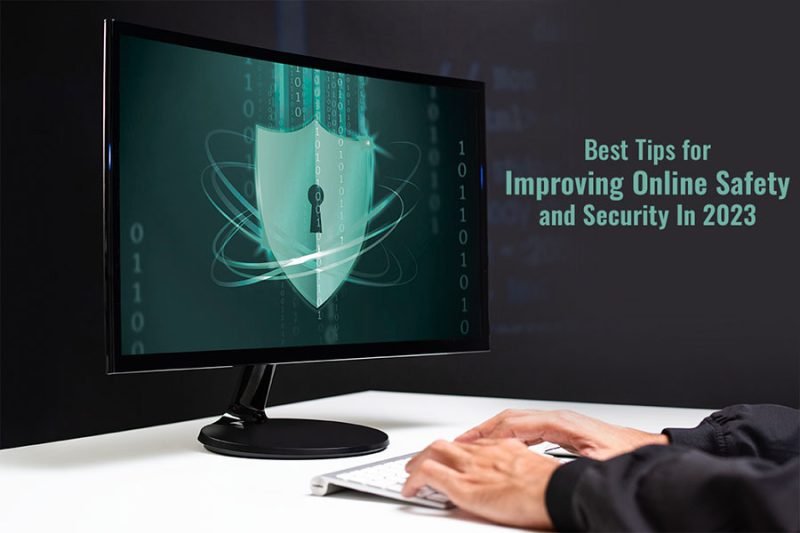
Cyber attacks have become part and parcel of life. Their intensity has become manifold, and cyber criminals continuously develop clever, more sophisticated ways to steal data and cause mayhem. Therefore, let all your New Year resolutions take a backseat for a minute. The first thing you must do in 2023 is to improve your online security and safety. Since you are already a few months too late, hurry up!
Here are cybersecurity tips to keep you safe online in 2023 and beyond.
Be Cautious Before Clicking on Any Link
Being cautious is one of the most essential cybersecurity tips that you must use to stay safe online. For example, you must refrain from clicking unknown links you receive through messages, emails, or while visiting unsecure website pages.
One of the most common methods cybercriminals use to access people’s personal information is clickjacking. Therefore, you must always verify links before clicking them. If you click malicious links, it can create mayhem.
Block Unwanted Senders on Gmail
If you were asking can you block Gmail emails, the answer is yes. You can quickly stop someone from sending you emails that might be harmful or spammy by blocking them.
Gmail’s spam blocker will ensure you don’t get annoying emails. This is one way to filter messages so you can stay safe online.
Use Strong Password
Using strong and unique passwords is one of the best ways of staying secure and safe online. Although it will be easy to remember the same password across several platforms for all your online accounts, it makes you vulnerable to cyber-attacks.
You must create unique passwords for your different accounts and ensure to change them regularly. If you find it challenging to remember all the different passwords for your accounts, you can use a password manager.
Some helpful tips for creating passwords for your accounts are:
- Do not use the same password twice.
- Ensure the passwords are more than eight characters and combine numbers, letters, special characters, etc. You must use one lowercase letter, an uppercase letter, and symbols.
- Do not create passwords with clues from your personal life, such as anniversary date, birth date, pet’s name, etc.
Set up 2FA and MFA
Passwords are not enough anymore. If you want to keep your online accounts safe, you must enable 2FA or MFA. This will add extra layers of security on top of using passwords. With these enabled, you will have to enter your password and also a security code sent to your email or phone to access your accounts.
You may even get a prompt to add other authentication methods, such as a fingerprint, code, or OTP.
With these extra layers of security, it becomes challenging for hackers to access your personal data.
Use Vpn To Connect to Public Wi-Fi
If you frequently connect to public Wi-Fi, you expose your data to hackers using the same network. So the next time you connect to a public Wi-Fi, use a VPN or virtual private network.
VPNs allow devices to be secured as it encrypts the traffic between your device and the service. This deters hacking attempts and keeps your device safe.
Please note that free VPNs are readily available in the marketplace but do more harm than good. Therefore, when safety is the top priority, you must opt for premium VPNs.
Use Antivirus Programs and Firewalls
Cybercriminals are more intelligent than you think and are coming up with different ways to attack networks and systems. Some common methods are phishing attacks, spyware, malware, trojans, viruses, etc. With these methods, hackers attempt to access and steal your data.
You can prevent these attempts by using firewalls and antivirus software. You must regularly update your firewall system and antivirus programs to ensure they can protect you against the most sophisticated attacks.
Avoid Downloading From Suspicious Sources
Hackers and attackers use download links to gain access to systems and networks. This is one of the oldest tricks in their books. Therefore, you must not download from suspicious sources to save your system and data from being stolen.
Do not download irrelevant software or browser extensions. If you need to download items from the web, ensure you are downloading from a relevant and credible source.
The Bottom Line
Online data breaches and hacking attempts have risen exponentially over the past few years. Cybercriminals create mayhem by stealing data, crashing systems, and causing financial losses. You cannot afford to let hackers lay their hands on your personal information. This is why it is time to beef up cybersecurity measures. Whether you are an individual or running a business, keeping data safe must be your topmost concern.
Implement the cybersecurity tips mentioned above to exercise safe browsing practices and always stay alert. Best of luck!









